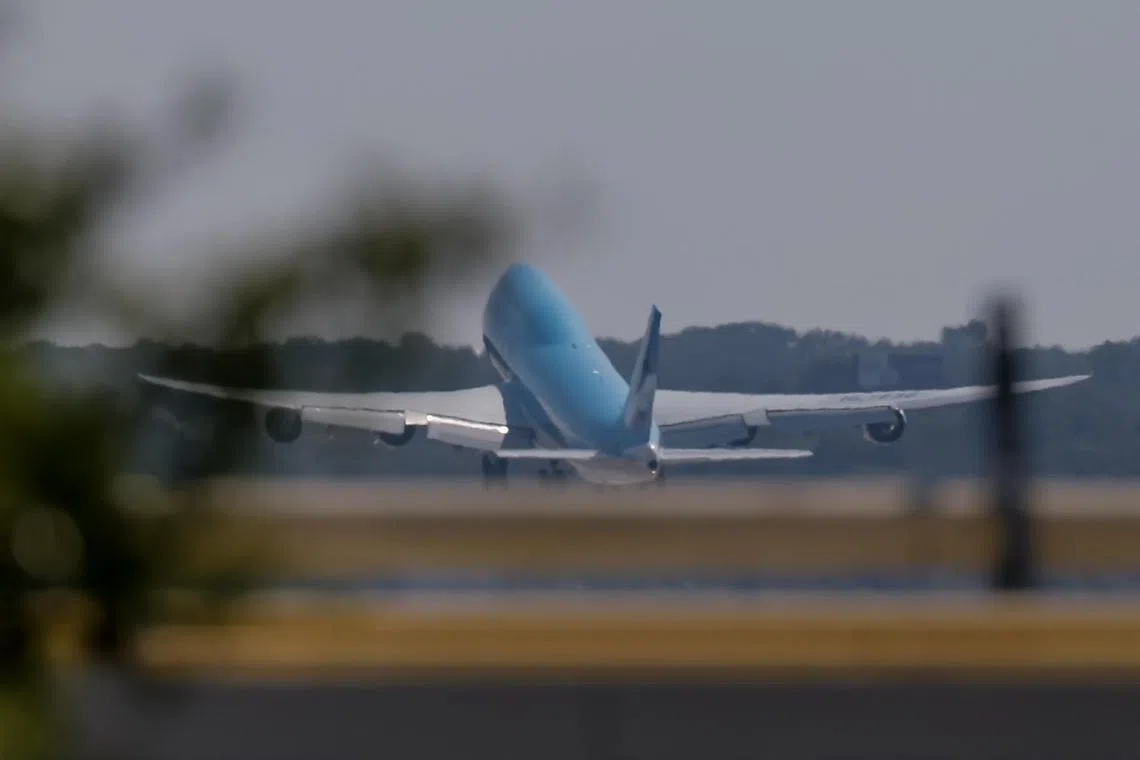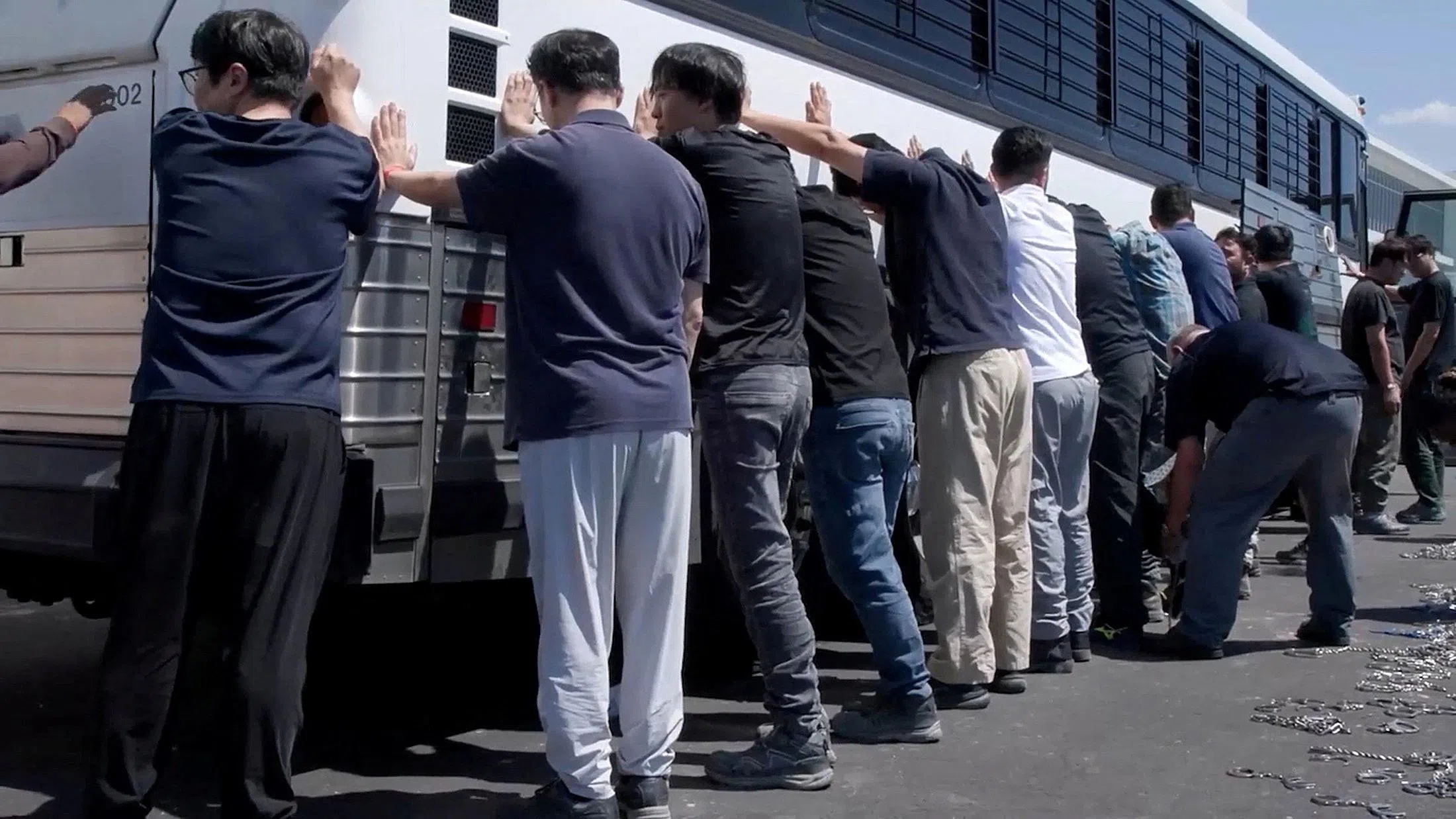South Korean workers head home after US immigration raid stunned ally
Sign up now: Get insights on Asia's fast-moving developments

A Korean Air Lines Boeing 747-800 charter flight departing the US for Seoul, with previously detained South Korean workers on board, on Sept 11.
PHOTO: EPA
Follow topic:
- US immigration raid detained hundreds of South Koreans, who were flown out on a chartered flight after Seoul protested.
- President Lee warned the "bewildering" raid could deter future South Korean investment in US factories and plants.
- Seoul seeks to negotiate visa solutions for investment-related purposes, including quotas or a new visa category.
AI generated
SEOUL – Hundreds of South Koreans detained in a US immigration raid were headed back to Seoul on Sept 12, after a stunned Seoul warned that the “bewildering” episode could have a chilling effect on future investment.
South Koreans made up the majority of the 475 people arrested
A specially chartered Korean Air Boeing 747-8I plane was seen flying out of Atlanta after South Korea said it had resolved the stand-off.
“Everything at Atlanta went smoothly,” a Foreign Ministry official told AFP on Sept 12, ahead of the workers’ expected arrival at 2pm. “The plane departed as scheduled with the planned number of passengers.”
The Georgia raid was the largest single-site operation conducted since US President Donald Trump launched a sweeping immigration crackdown, a top political priority since he returned to office in January.
Photographs published by the Yonhap news agency showed workers smiling and waving as they boarded buses after days in US detention.
South Korea is a staunch security ally and major investor for the US, with its top companies pouring billions into developing factories and plants in America.
South Korean President Lee Jae Myung called the raid “bewildering” and noted that it could have a chilling effect on future investment.
Mr Lee blamed the raid on “cultural differences”, saying that in South Korea, American nationals teaching English while on a tourist visa are not seen as “a serious issue”.
After the detentions, South Korean companies “can’t help but question whether setting up a plant in the US is worth the potential risks”, he added.
“This could have a significant impact on future investment decisions, particularly when evaluating the feasibility of direct operations in the US.”
Many South Korean companies have relied on bringing in their own workforce during project development periods, with industry sources telling AFP that it is common practice to use visa workarounds to bring in skilled labour and avoid project delays.
Mr Lee said that for South Korean companies “when setting up facilities, equipment and factories, skilled technicians are essential”.
“Someone has to install the machinery, and the necessary workforce simply doesn’t exist locally in the US,” he said, adding that the companies had long relied on bringing in their engineers for short-term periods to train local workers.
“But now, even that basic request is being rejected,” he said.
Asia’s fourth-largest economy maintains multiple plants in the US and has heeded Washington’s push to onshore manufacturing and boost investment in the country.

Detainees being made to stand against a bus before being handcuffed during a raid at a Hyundai plant in Georgia, US, on Sept 4.
PHOTO: REUTERS
Secretary of State Marco Rubio, meeting South Korean Foreign Minister Cho Hyun on Sept 10, told him that the US welcomed investment from the Asian country, according to the State Department.
The State Department also announced on Sept 11 that Mr Rubio’s deputy, Mr Christopher Landau, would travel shortly to Seoul to speak with both the government and businesses.
The Korean Confederation of Trade Unions (KCTU), one of the country’s largest umbrella union groups, called for an apology from Mr Trump and for Seoul to halt US investment plans.
“The Trump administration’s excessive mass arrests and detentions were a clear violation of human rights,” it said in a statement sent to AFP.
“The KCTU stands in full solidarity with the workers returning today and strongly urges President Trump to issue an official apology and calls for (South Korea’s) suspension of investments in the US.”
Handcuff shock
Mr Lee said Seoul was negotiating with Washington “to ensure that visa issuance for investment-related purposes operates normally”.
This could include “securing additional quotas” or even creating a new visa category, he said, adding that he trusted that the “US side will find a solution”.
“But under the current circumstances, Korean companies will have little choice but to hesitate about making direct investments in the US,” he added.
At the Hyundai factory site, construction will now be set back due to labour shortages, chief executive Jose Munoz said.
“This is going to give us minimum two to three months delay, because now all these people want to get back,” he added.
“Then you need to see how can you fill those positions. And, for the most part, those people are not in the US.”
The operation was the largest single-site raid conducted since Mr Trump launched a sweeping immigration crackdown, a top political priority since he returned to office in January.
The raid came less than a month after the US leader welcomed Mr Lee to the White House.
The site of the raid is a US$4.3 billion (S$5.5 billion) venture to build a battery cell manufacturing facility in Georgia.
LG Energy Solution – which said 47 of its employees were arrested, along with about 250 people working for its contractor – thanked the Seoul government for its support.
Seoul sent a task force and flew in top officials to negotiate, with a focus on ensuring that workers would not suffer repercussions should they seek to re-enter the US.
“We are especially grateful for their exceptional efforts... for their meticulous attention to addressing various concerns, including ensuring no disadvantages upon re-entry,” the company said in a statement.
LG said it remained committed to its US projects, adding that it was also working to minimise “any business impact resulting from this incident”.
Images of the South Korean workers being chained and handcuffed have caused widespread alarm, and Seoul has said it negotiated to make sure the workers were not handcuffed again as they were repatriated.
The raid highlights lopsided priorities in the Trump administration, which is “actively bringing in large-scale production facilities while neglecting to train local workers”, said business professor Kim Dae-jong, of Sejong University.
“As a result, South Koreans are having to train the local workforce. Logically, the two sides’ workers should be allowed to work together, not be hindered from doing so,” he told AFP.
But economics professor Cho Dong-geun, of Myongji University, warned that South Korean companies had long been aware of the visa problems.
“It is regrettable that there was no earlier intervention to address these matters in response to President Trump’s anti-immigration agenda, which should have been acted on more swiftly.” AFP

